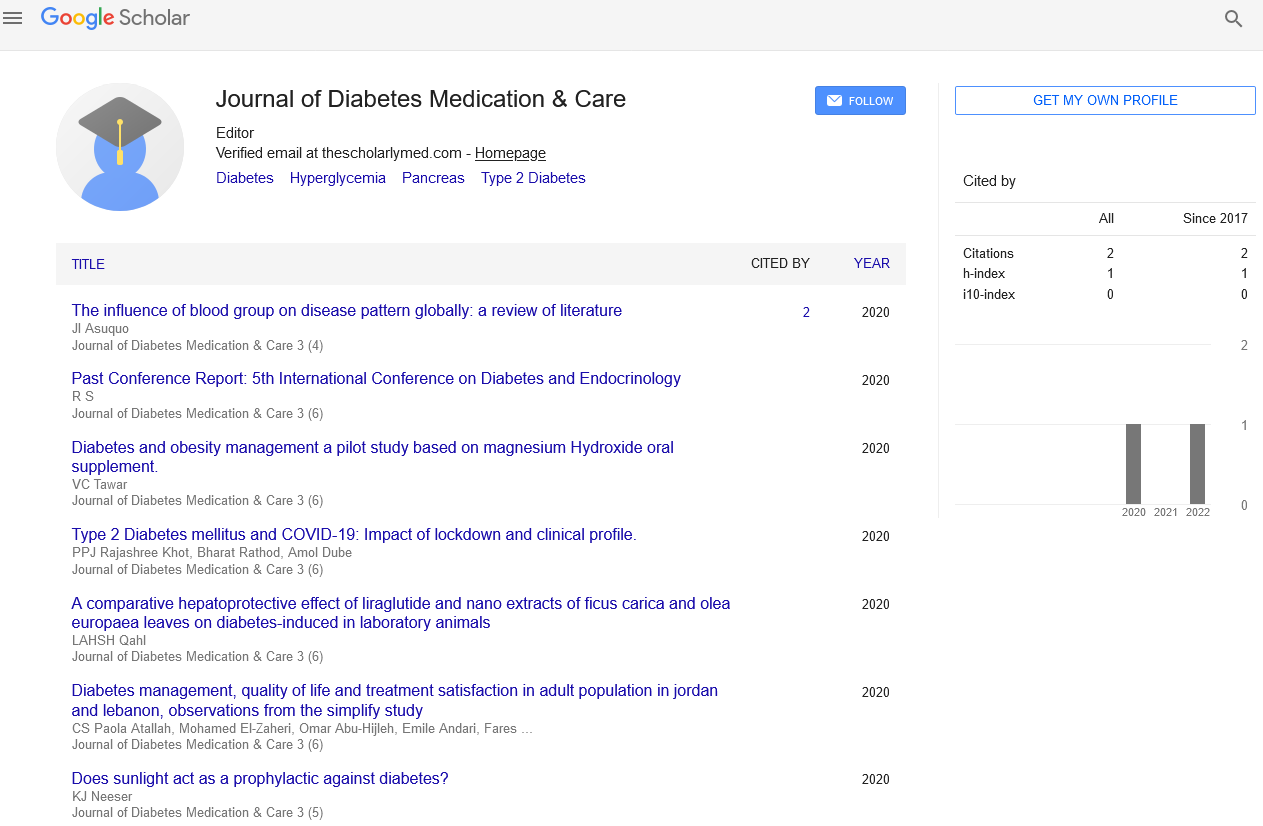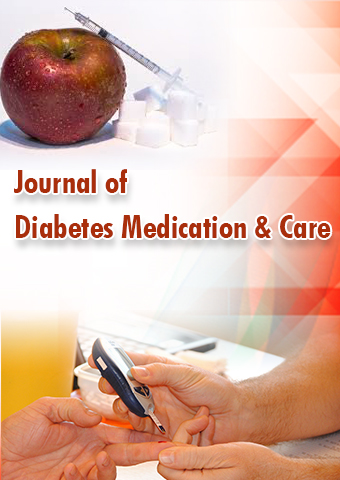Opinion Article - Journal of Diabetes Medication & Care (2024) Volume 7, Issue 5
The Effects of Sleep on Glycemic Control: Understanding the Connection
- Corresponding Author:
- Xa Lin
Department of Diabetes and Management, University of Turku, Turku, Finland
E-mail: linxa@mail.fjmu.edu.cn
Received: 02-Sep-2024, Manuscript No. JDMC-24-148358; Editor assigned: 05-Sep-2024, PreQC No. JDMC-24-148358 (PQ); Reviewed: 19-Sep-2024, QC No. JDMC-24-148358; Revised: 17-Oct-2024, Manuscript No. JDMC-24-148358 (R); Published: 24-Oct-2024, DOI: 10.37532/JDMC.2024.7(5).269-271
Introduction
Sleep is a fundamental aspect of human health that influences various physiological processes, including metabolism, hormone regulation, and cognitive function. Recent research has increasingly focused on the relationship between sleep and glycemic control, particularly in individuals with diabetes and those at risk of developing the condition. Poor sleep quality and insufficient sleep duration have been linked to impaired glucose metabolism, insulin resistance, and an increased risk of type 2 diabetes. This article explores the intricate relationship between sleep and glycemic control, examining the mechanisms involved, the impact of sleep disorders, and strategies for improving sleep quality.
Description
The importance of sleep
Dried Sleep is essential for physical and mental health, playing a crucial role in maintaining homeostasis. The National Sleep Foundation recommends that adults aim for 7 to 9 hours of sleep per night. Insufficient sleep can lead to a range of health issues, including cardiovascular disease, obesity, and metabolic disorders. Sleep is not merely a time for rest; it is a dynamic process that supports numerous bodily functions, including:
Hormonal regulation: Sleep influences the secretion of hormones such as insulin, cortisol, and growth hormone, all of which are vital for metabolic health.
Cognitive function: Adequate sleep enhances cognitive performance, memory consolidation, and emotional regulation.
Immune function: Sleep is integral to a well-functioning immune system, aiding in recovery and protection against illness.
Sleep and glycemic control: The evidence
Sleep duration and quality: Numerous studies have shown a correlation between sleep duration and glycemic control. Short sleep duration (less than 6 hours per night) is associated with higher fasting glucose levels and increased insulin resistance. Conversely, getting adequate sleep helps maintain healthy blood sugar levels and improves insulin sensitivity.
Research findings: A study published in diabetes care found that individuals who reported short sleep duration were more likely to have elevated fasting glucose levels and higher HbA1c levels compared to those who slept longer. Additionally, poor sleep quality characterized by frequent awakenings and restless sleep has also been linked to worse glycemic control.
The role of sleep disorders
Sleep disorders, such as Obstructive Sleep Apnea (OSA) and insomnia, can have profound effects on glycemic control. OSA, a condition characterized by repeated interruptions in breathing during sleep, is particularly concerning for individuals with diabetes.
Obstructive sleep apnea: OSA is associated with increased insulin resistance and poor glycemic control. The intermittent hypoxia experienced during sleep apnea can lead to oxidative stress and inflammation, further exacerbating insulin resistance. Studies indicate that treating OSA can improve glycemic control in patients with type 2 diabetes.
Insomnia: Chronic insomnia, characterized by difficulty falling or staying asleep, is linked to increased levels of stress hormones, such as cortisol, which can negatively impact glucose metabolism. Insomnia has been shown to be associated with higher fasting blood sugar levels and greater insulin resistance.
Circadian rhythm and metabolism
The body’s internal clock, or circadian rhythm, regulates various physiological processes, including the sleep-wake cycle and metabolic functions. Disruptions to this rhythm such as irregular sleep patterns and shift work can have detrimental effects on glycemic control.
Circadian misalignment: Research suggests that circadian misalignment may lead to altered insulin sensitivity and impaired glucose tolerance. For instance, individuals who work night shifts often experience disrupted sleep patterns, which can contribute to an increased risk of developing type 2 diabetes.
Meal timing: The timing of meals in relation to the sleep-wake cycle can also influence glycemic control. Eating at irregular hours or consuming late night meals can negatively impact insulin sensitivity and glucose metabolism.
Mechanisms linking sleep and glycemic control
The relationship between sleep and glycemic control is complex and involves several biological mechanisms:
Hormonal regulation: Sleep deprivation and poor sleep quality can disrupt the normal secretion of hormones that regulate glucose metabolism.
Insulin: Inadequate sleep can lead to decreased insulin sensitivity, meaning that the body requires more insulin to lower blood sugar levels effectively.
Cortisol: Lack of sleep can elevate cortisol levels, a stress hormone that promotes gluconeogenesis (the production of glucose from non-carbohydrate sources), leading to increased blood sugar levels.
Ghrelin and leptin: Sleep deprivation affects the balance of ghrelin (hunger hormone) and leptin (satiety hormone), potentially leading to increased appetite and weight gain, both of which are risk factors for poor glycemic control.
Inflammation: Chronic sleep deprivation is associated with increased levels of inflammation in the body, which can impair insulin signalling and contribute to insulin resistance. Inflammatory markers, such as C-Reactive Protein (CRP), are often elevated in individuals with poor sleep, creating a vicious cycle that negatively affects metabolic health.
Impaired cognitive function
Sleep plays a critical role in cognitive function, including decision making and impulse control. Sleep deprived individuals may struggle with making healthy food choices and adhering to their diabetes management plans, which can further exacerbate glycemic control issues.
Strategies for improving sleep and glycemic control
Given the strong connection between sleep and glycemic control, adopting strategies to improve sleep quality is essential for individuals with diabetes or those at risk:
Establish a consistent sleep schedule: Maintaining a regular sleep schedule by going to bed and waking up at the same time each day can help regulate the circadian rhythm and improve overall sleep quality.
Create a sleep-friendly environment: A conducive sleep environment includes a dark, quiet, and cool room. Using blackout curtains, white noise machines, and comfortable bedding can enhance the sleep experience.
Limit screen time: Reducing exposure to screens (phones, tablets, computers) before bedtime can help minimize the effects of blue light, which can interfere with the production of melatonin, a hormone that regulates sleep.
Practice relaxation techniques: Incorporating relaxation techniques, such as mindfulness, meditation, or deep breathing exercises, can help reduce stress and promote better sleep.
Monitor diet and exercise: Eating a balanced diet and engaging in regular physical activity can significantly improve sleep quality. Avoiding large meals, caffeine, and alcohol close to bedtime is also recommended.
Seek treatment for sleep disorders: For individuals experiencing chronic sleep issues, seeking evaluation and treatment for sleep disorders like insomnia or OSA is crucial. Effective management of these conditions can lead to improvements in both sleep quality and glycemic control.
Conclusion
The effects of sleep on glycemic control are profound and multifaceted. Sleep quality and duration play critical roles in regulating blood sugar levels, insulin sensitivity, and overall metabolic health. By understanding the intricate relationship between sleep and diabetes, individuals can take proactive steps to improve their sleep habits, which may lead to better glycemic control and a reduced risk of diabetes related complications. As research continues to evolve, it becomes increasingly clear that prioritizing sleep is an essential component of comprehensive diabetes management and overall health.

